Dispatches from NYC Mayoral Election Trail: Woodside, the Ravidassia Sikh Temple and Jackson Heights
An account of my reporting on the NYC Democratic Primaries

As I have teased in my previous posts, I’m working on an extensive piece on the NYC Mayoral Election. While it’s a departure from keeping an exclusive focus on caste, this reporting is crucial because it sheds a spotlight on the often overlooked South Asian communities in New York City that are frequently depicted through erroneous and mythical ideas around caste, class, regional and religious identities perpetuated in mainstream media narratives.
Even as I continue reporting on the larger piece, there are too many important stories that might not fit there but still need to be told. So in the absence of a dedicated local South Asian media space, this series is an attempt to understand the fragmented yet culturally cohesive South Asian community, and their political engagement, especially in the lead up to Democratic Mayoral Primary on June 24. Read along and follow.
As a Dalit woman who publicly acknowledged my caste only once I left India, my relationship with my South Asian identity has been fraught to say the least. When I left New Delhi, a city that had been my home for close to 10 years at that time, I was also escaping a never-ending game of “pin the tail on the caste donkey” that nearly everyone in Indian society plays so they can solve the burning question of accurately determining someone’s caste. Seeing as I belonged to one of the lowest castes (bhangi/manual scavenger) in the labyrinthian system, and was actively hiding this fact, I was always at the risk of being pinned.
When I moved to New York in 2014, I lived in Washington Heights, a Latin American neighborhood which at that time had a barely noticeable South Asian population. I chose it for its proximity to the university I attended, and stayed because it was as far as I could live from ‘my own people’. I was keen to stake out an identity that was distinct from the community I belonged to, and eager to possibly never have to answer “What caste I came from” or “What did my last name mean”. I also hoped to get away from the kind of policing, hierarchy and segregation that South Asian women aggressively experience in these spaces, especially if they are discovered to be from a ‘lower’ caste.
So a decade after I began calling this city home, when I decided to embark on reporting which would take me to South Asian neighborhoods I had never visited (save for an errant trip to Jackson Heights to stock up on spices), I was somewhat apprehensive. Especially since I had written a book declaring my ‘lower’ untouchable caste, which was no longer hidden.
In the spirit of ‘start with what you know’, I decided to visit the Shri Guru Ravidass Gurudwara in Woodside, Queens, a Dalit Sikh place of worship, which was initially founded in 1987 (and moved to the Woodside location a few years ago), when the Dalit Sikh community found themselves unwelcome in other Gurdwaras in the city (an eye roll hat tip for the South Asians who think caste in the US doesn’t exist).
On a warm Spring evening in late April, the gurudwara was mostly empty, save for the head priest who was sitting on a bench. When I approached him to ask about the Mayoral election, he said he didn’t vote (without specifying if he could), but instead told me at length about the caste discrimination he had experienced growing up in Punjab in India, and as a Ravidassia Sikh priest in other congregations he had served in the past. “You know how it is, you can’t enter their [dominant caste Sikh/Punjabi] homes and have to remain deferential to their ‘higher’ caste, even when you’re an elderly person and they are much younger.” he said when I revealed that like him, I too was Dalit, and added, “There is discrimination here too”.
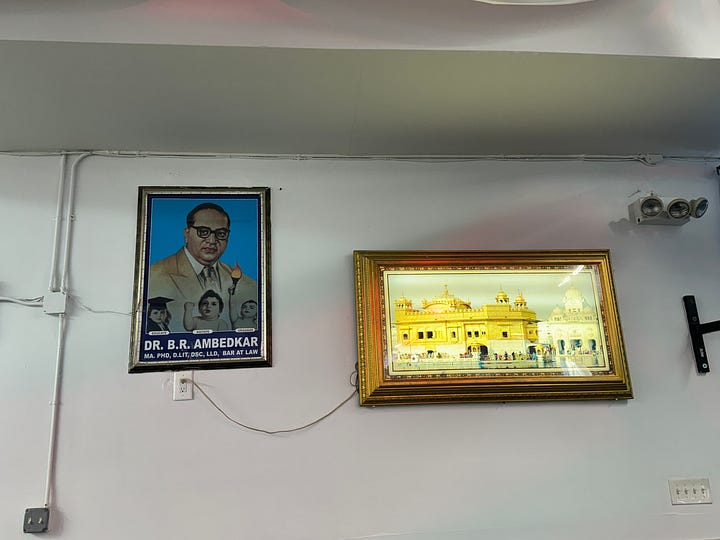
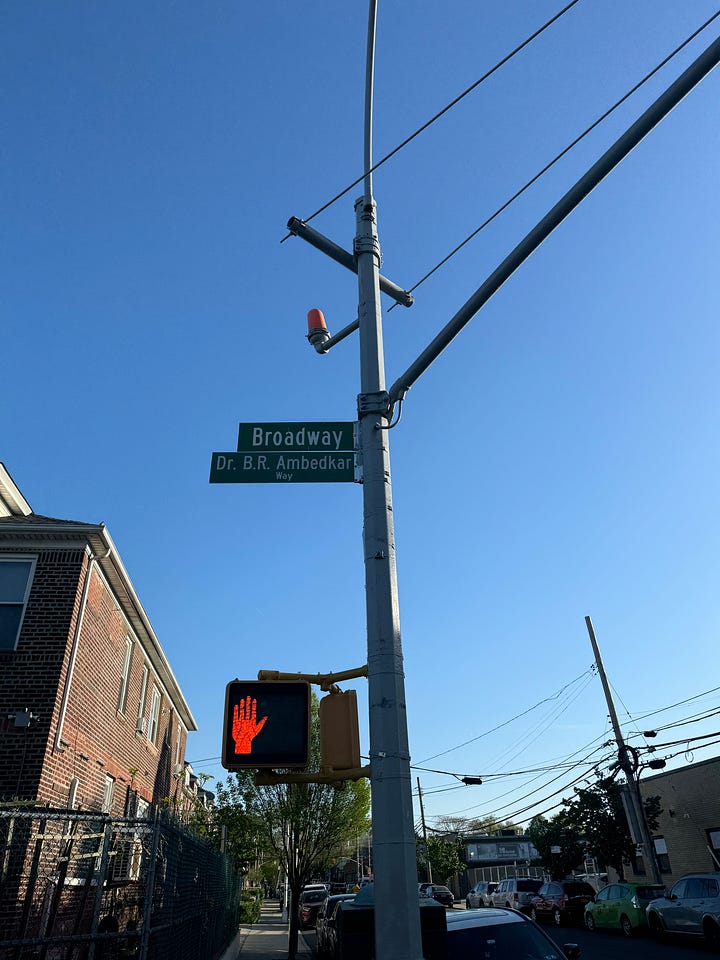
When I asked him if he could connect me to someone who possibly could vote in this election, he called a person associated with the trust over the speaker phone, who did not know that there was a Democratic Primary election in June. So I took the details for the Gurudwara press secretary and promised to return on a Sunday when it would be crowded for prayers and the langar meal.
Although I was unable to learn more about their engagement for the New York Mayoral race, it was clear this was a deeply political space. Along with religious iconography, there was a large poster of the iconoclastic Dalit civil rights leader and the architect of the Indian constitution Dr. Bhim Rao Ambedkar, nestled next to a framed photograph of the Golden Temple in Amritsar, India. Earlier that month, the Gurudwara had celebrated the 134th birth anniversary of Dr. Ambedkar, and hosted Indian Dalit leader and political firebrand, Chandrashekhar Azad on his visit for the occasion. The Ravidassia Gurudwara was also instrumental in the renaming of the street that faces its entrance as ‘Dr. B.R. Ambedkar way’ in 2023, a radical assertion of Dalit political power, given that Dalits are often subjected to violence and ostracization for simply chanting slogans of ‘Jai Bhim’ associated with his name, both in India and even, here in New York.
As I walked past a shop named ‘Who’s Papi? Tires by Papi’ deeper into Woodside, I came across a row of Bangladeshi grocery stores, bakeries and driving schools that doubled as English learning centers, with their names written both in Bangla and English. I ducked into a few shops to speak to some people, but the evening grocery run was already afoot, and the cashiers looked too busy to discuss the Mayoral election. A few who spoke to me said they couldn’t vote or did not have ‘time to discuss politics’. Upon overhearing some women in burkhas discussing a breast cancer diagnosis I decided to keep walking to the nearby Jackson Heights market to continue with the reporting, but not before stopping at another Bangladeshi owned store, where the owner, Munir, who had been in New York for over 35 years, seemed in chatty mood.
Upon asking if he had heard of the NYC Mayoral election and if he planned to vote, he said he hadn’t heard of Zohran Mamdani (who has Indian born parents) but he was planning to vote for Andrew Cuomo. Munir did not seem to mind that Cuomo was battling corruption charges and allegations of sexual harassment. “Everyone has something. I have a wife, maybe I have something [in my past] as well. That does not bother me,” he said. But as I thanked him and started walking out, he called me back to say that he was open to changing his mind if some other campaign spoke to him and educated him about their platform.
“We need a Muslim leader, but why is he so late? He needs to strengthen his roots to secure the platform”, said Asif Bari about Zohran Mamdani
A few blocks away, into the Jackson Heights market, the crowd was as bustling as on a weekend, even though it was only Wednesday. I tried to unsuccessfully engage some folks waiting for a bus by asking if they had heard of the Mayoral candidate who is offering fast and free buses (Mamdani), but didn’t get much in terms of a response. Some shop owners were trying to close up for the day and leave, and others were huddled on the side of the road, smoking cigarettes and chatting intensely, and I decided to leave them alone.
Just about ready to give up for the evening, I spotted a small sign for a South Asian Community Center that offered English language classes and immigration assistance. Inside, a class was in session, and almost everyone was a recent immigrant who could not vote yet. But next to the entrance there was another sign, for the popular Bangla language newspaper Thikana, which had recently moved home into a shiny, new building a few blocks away. Upon arriving there, I discovered that this building was a local community media hub, which also housed another Bangla publication, called Bari News. Although the editor for Thikana had left for the day (I took down his number to call him later), the office of Bari News was still open. Inside were three computer set ups with designers frantically type-setting next day’s edition, and the editor Munmun Bari standing next to them and overseeing every change. She generously agreed to take some time to chat with me if I was willing to wait a few minutes, since it was time for evening prayer.
After 30 minutes that I was happy to sit for, she invited me to speak with her and her husband Asif Bari, who introduced himself as a business leader. While both declined to be recorded for an interview, Munmun Bari mentioned that they had hosted Zohran Mamdani for a fundraiser at their grocery store in the Bronx, and knew that he was a practicing Muslim. However, Asif Bari felt it was ‘too late’ for Mamdani to reach out to the community (this conversation took place in late April), “We need a Muslim leader, but why is he so late [in contacting us]? He needs to strengthen his roots to secure the platform”, and added that they had hosted other leaders like Mayor Eric Adams and New York State Rep, Jennifer Rajkumar at their home in the past.
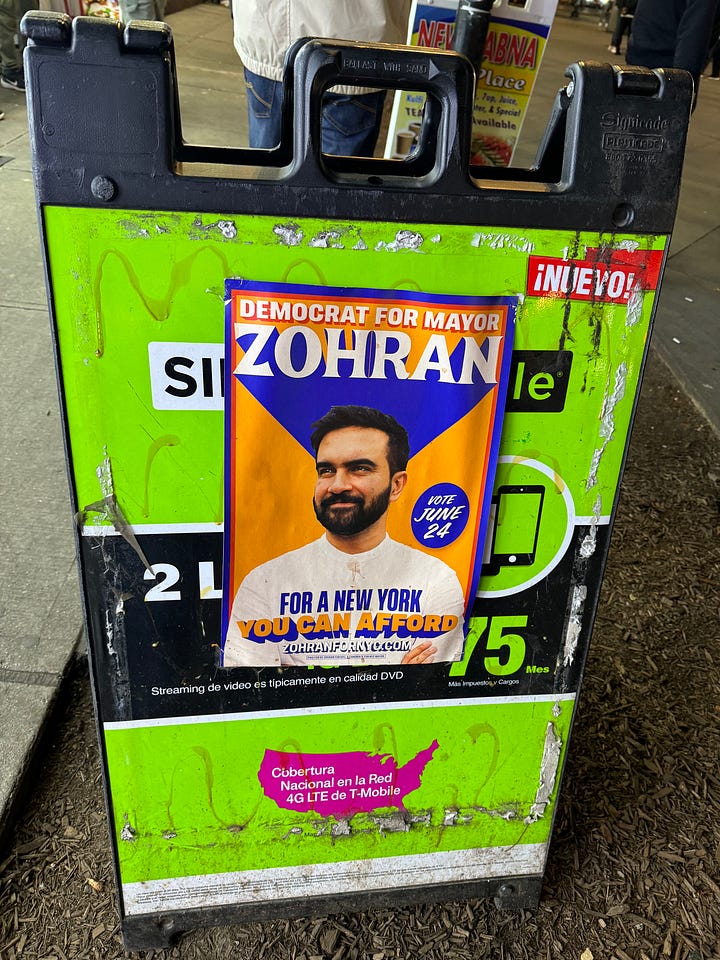
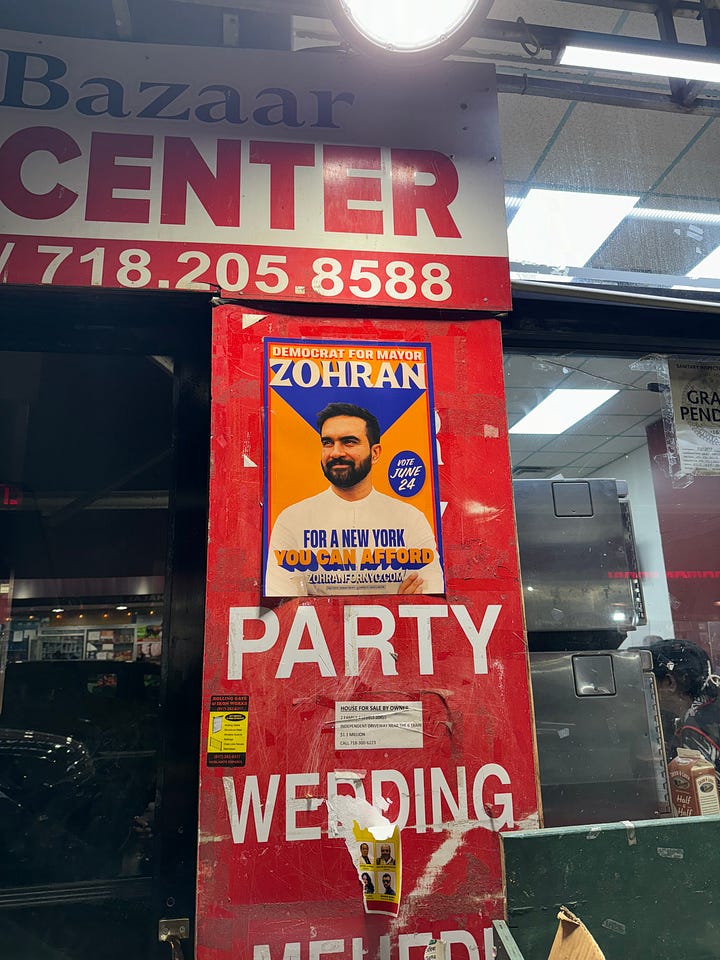
It was dark when I left the building which was named ‘Bari Tower’, presumably after its owners, and I walked over to Diversity Plaza, an open area with chairs and shops on all sides, where I saw a poster by Zohran Mamdani pasted on a standee. The shop owner, Naveed Aram was from Pakistan and ran a mobile repair business. He said he supported Zohran Mamdani for Mayor because he liked his proposals and that it was important to have someone from “our community”. He said that former NYC Mayor Bill De Blasio “left them alone” but under Eric Adams, the community was facing more hardship, like vendors trying to make a come back after Covid getting their items seized. “I follow him on social media… my wife showed me his account. The one thing I liked about him, he never asked for money. Desis always ask for money, but he didn’t,” Aram said while speedily fixing the phone screen for a customer who waited while we talked.
The only other signs of the incoming Mayoral election that I noticed, were other Mamdani posters, including one at Merit Kebab, the restaurant I chose for dinner, which sold buffet style Indian, Pakistani, Nepali and Bangladeshi cuisine. The owner, Ali, who was friendly and open to talking (I was a paying customer so he probably felt more inclined) had not heard of the elections but recalled that some volunteers had come and pasted the posters on the walls.
As I took the first bite of the daal and the tenderest of beef kebabs, I thought about how different some of these interactions might have looked if I had also asked them about caste. My anxiety about reporting from a South Asian neighborhood was in fact a reflection of my dread over living in one. Visiting these spaces for a day, instead of building a life in them, freed me from encountering caste in my daily life. This choice gave me a false sense of castelessness, but also the kind of alienation that comes with not knowing where you belong. But more on that later.
More
Related reading on the NYC Mayoral Election:
Zohran Mamdani's South Asianness doesn't scream from the rooftops





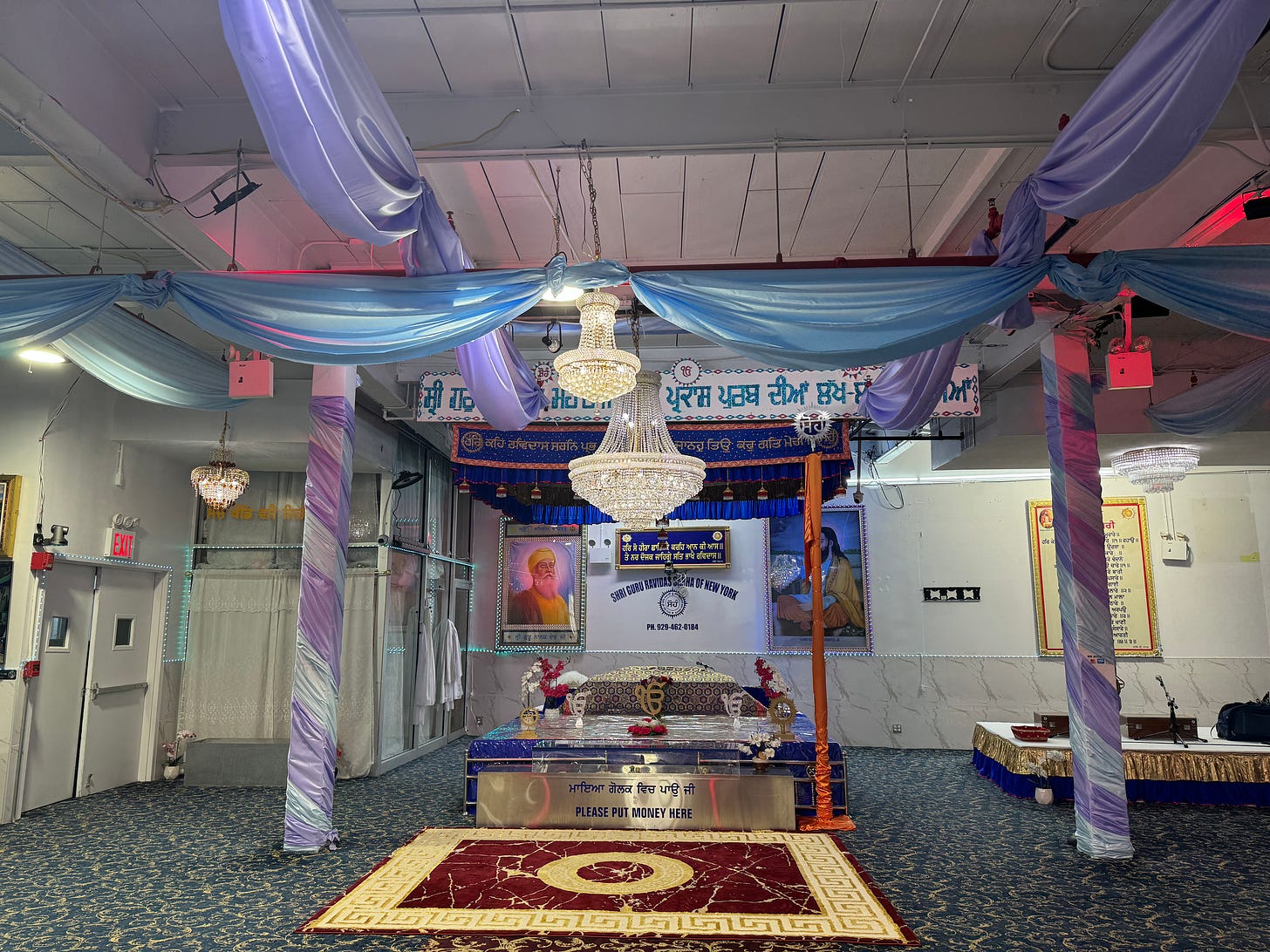
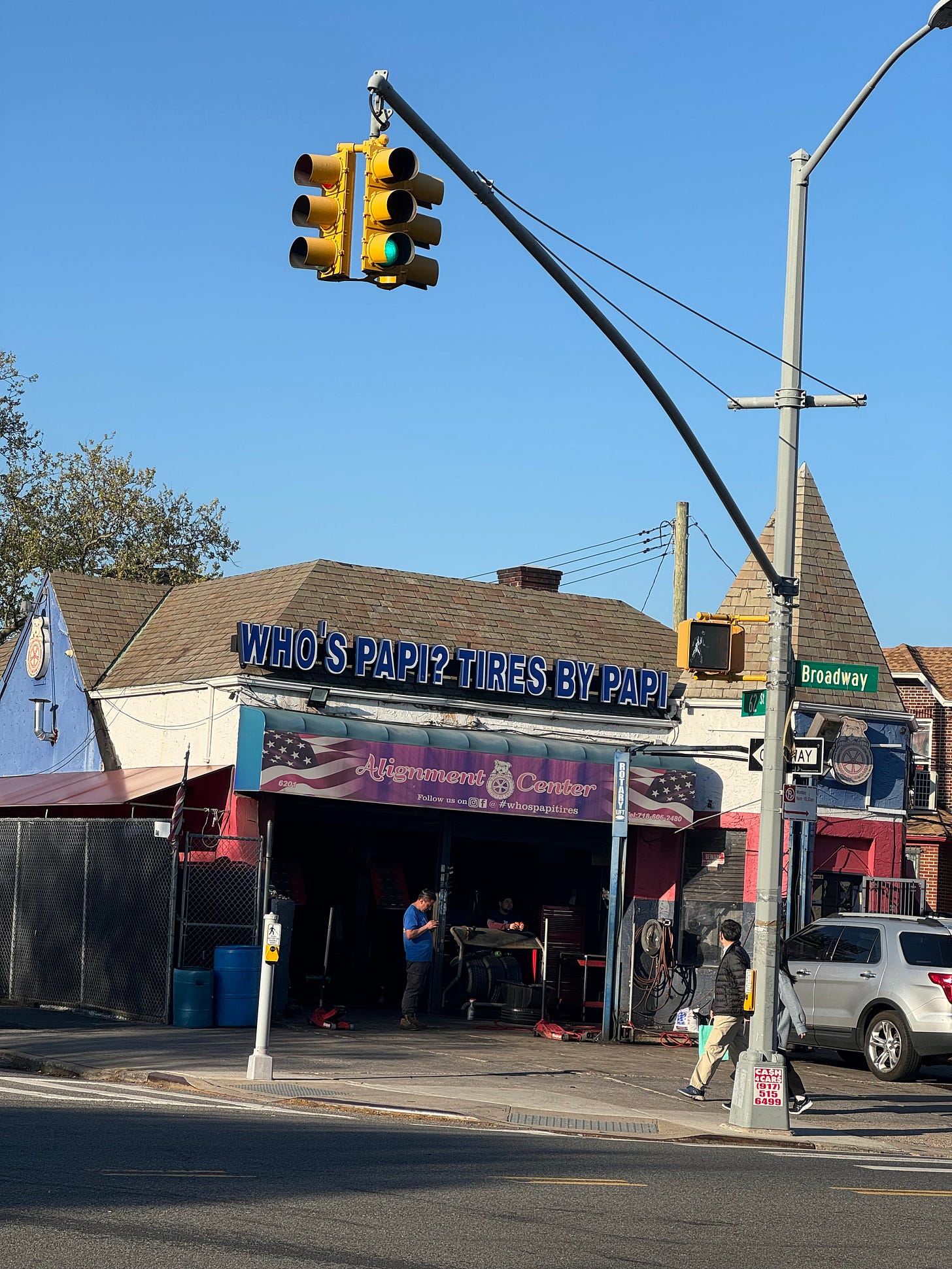
Yashica, i am delighted to read you essay. Thank you for introducing to readers the South Asians we see and hear who are working in businesses in Jackson Heights and Queens but who do not appear in any of the mainstream news media. What is you say is true--caste is something that continues to be insidious and is shrugged off as "history."